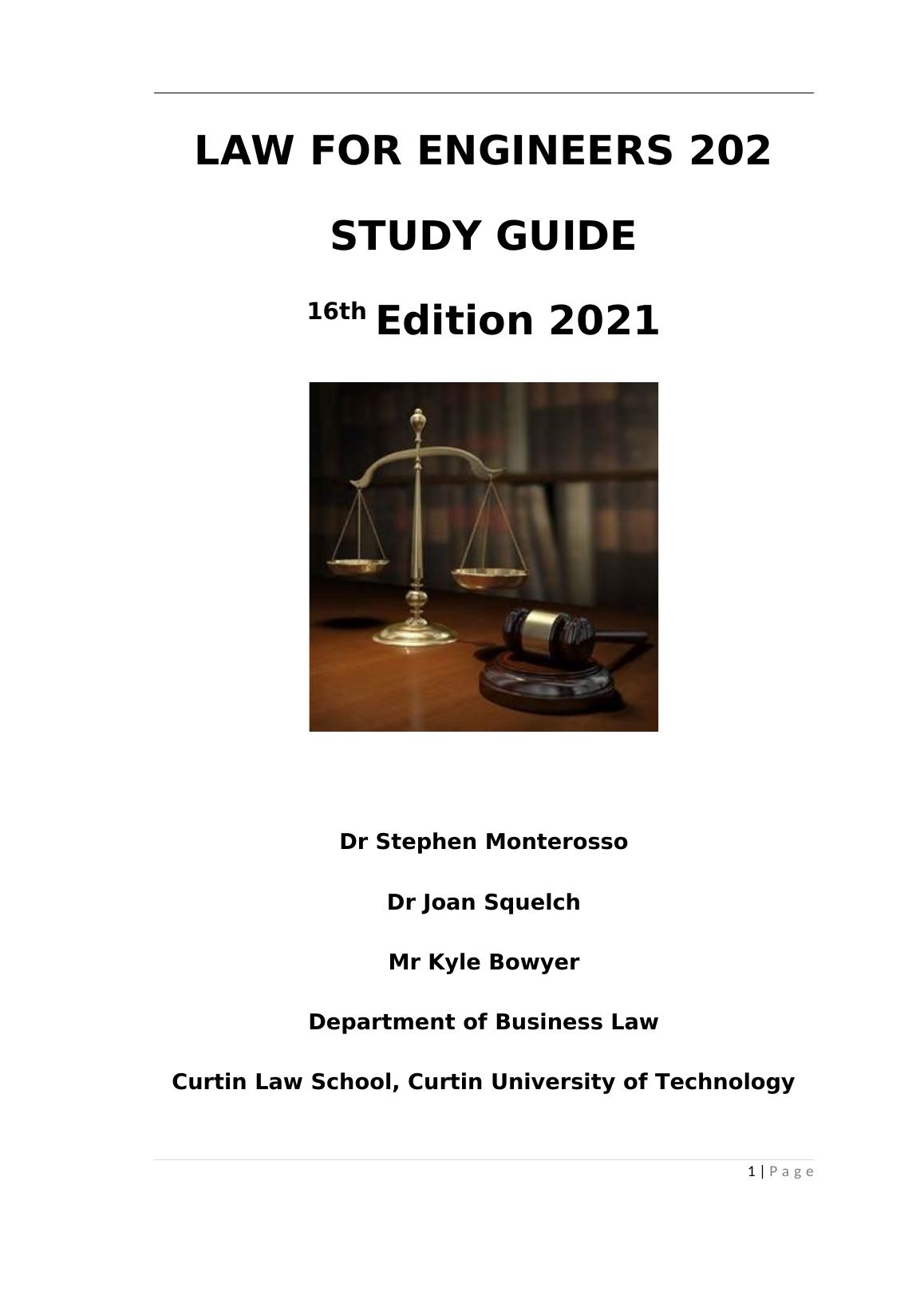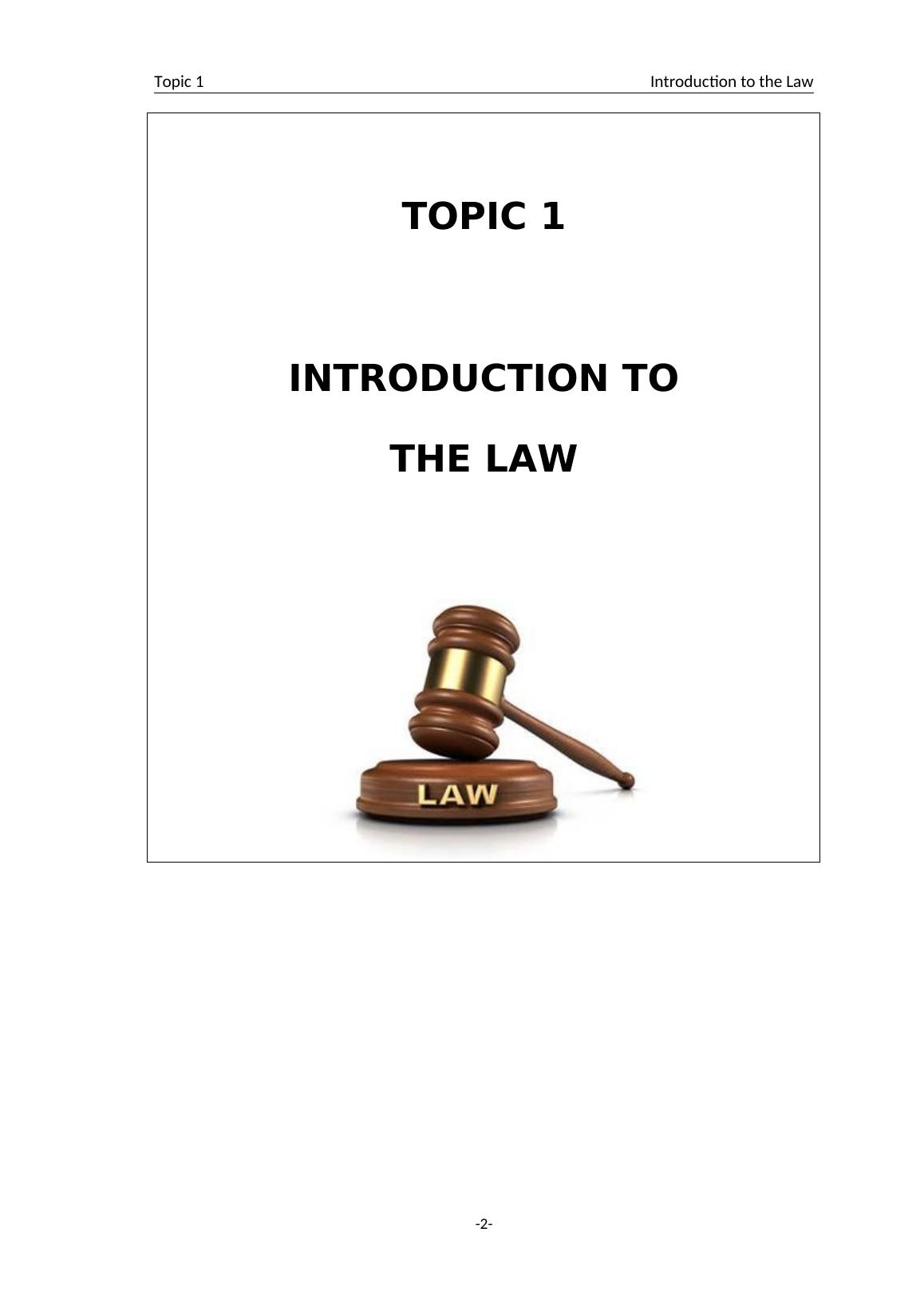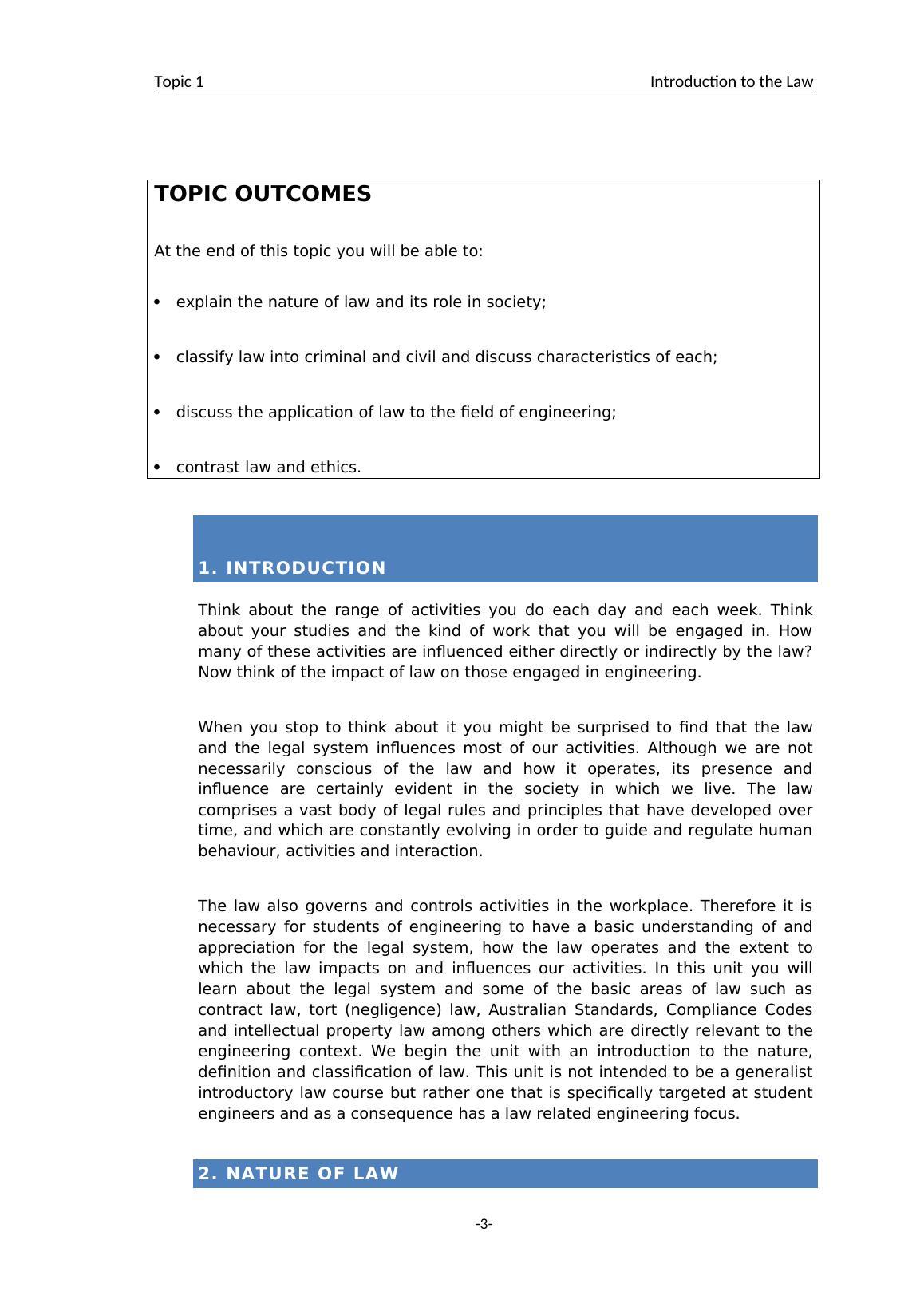Ask a question from expert
Department of Business Law PDF
17 Pages5444 Words129 Views
Added on 2021-10-13
Department of Business Law PDF
Added on 2021-10-13
BookmarkShareRelated Documents
LAW FOR ENGINEERS 202
STUDY GUIDE
16th Edition 2021
Dr Stephen Monterosso
Dr Joan Squelch
Mr Kyle Bowyer
Department of Business Law
Curtin Law School, Curtin University of Technology
1 | P a g e
STUDY GUIDE
16th Edition 2021
Dr Stephen Monterosso
Dr Joan Squelch
Mr Kyle Bowyer
Department of Business Law
Curtin Law School, Curtin University of Technology
1 | P a g e

Topic 1 Introduction to the Law
TOPIC 1
INTRODUCTION TO
THE LAW
-2-
TOPIC 1
INTRODUCTION TO
THE LAW
-2-

Topic 1 Introduction to the Law
TOPIC OUTCOMES
At the end of this topic you will be able to:
explain the nature of law and its role in society;
classify law into criminal and civil and discuss characteristics of each;
discuss the application of law to the field of engineering;
contrast law and ethics.
1. INTRODUCTION
Think about the range of activities you do each day and each week. Think
about your studies and the kind of work that you will be engaged in. How
many of these activities are influenced either directly or indirectly by the law?
Now think of the impact of law on those engaged in engineering.
When you stop to think about it you might be surprised to find that the law
and the legal system influences most of our activities. Although we are not
necessarily conscious of the law and how it operates, its presence and
influence are certainly evident in the society in which we live. The law
comprises a vast body of legal rules and principles that have developed over
time, and which are constantly evolving in order to guide and regulate human
behaviour, activities and interaction.
The law also governs and controls activities in the workplace. Therefore it is
necessary for students of engineering to have a basic understanding of and
appreciation for the legal system, how the law operates and the extent to
which the law impacts on and influences our activities. In this unit you will
learn about the legal system and some of the basic areas of law such as
contract law, tort (negligence) law, Australian Standards, Compliance Codes
and intellectual property law among others which are directly relevant to the
engineering context. We begin the unit with an introduction to the nature,
definition and classification of law. This unit is not intended to be a generalist
introductory law course but rather one that is specifically targeted at student
engineers and as a consequence has a law related engineering focus.
2. NATURE OF LAW
-3-
TOPIC OUTCOMES
At the end of this topic you will be able to:
explain the nature of law and its role in society;
classify law into criminal and civil and discuss characteristics of each;
discuss the application of law to the field of engineering;
contrast law and ethics.
1. INTRODUCTION
Think about the range of activities you do each day and each week. Think
about your studies and the kind of work that you will be engaged in. How
many of these activities are influenced either directly or indirectly by the law?
Now think of the impact of law on those engaged in engineering.
When you stop to think about it you might be surprised to find that the law
and the legal system influences most of our activities. Although we are not
necessarily conscious of the law and how it operates, its presence and
influence are certainly evident in the society in which we live. The law
comprises a vast body of legal rules and principles that have developed over
time, and which are constantly evolving in order to guide and regulate human
behaviour, activities and interaction.
The law also governs and controls activities in the workplace. Therefore it is
necessary for students of engineering to have a basic understanding of and
appreciation for the legal system, how the law operates and the extent to
which the law impacts on and influences our activities. In this unit you will
learn about the legal system and some of the basic areas of law such as
contract law, tort (negligence) law, Australian Standards, Compliance Codes
and intellectual property law among others which are directly relevant to the
engineering context. We begin the unit with an introduction to the nature,
definition and classification of law. This unit is not intended to be a generalist
introductory law course but rather one that is specifically targeted at student
engineers and as a consequence has a law related engineering focus.
2. NATURE OF LAW
-3-

Topic 1 Introduction to the Law
A. WHAT IS LAW?
Any study of law should include, at least, a brief understanding of the nature
of law and its role in society. There are many opinions on what law is, and on
how law, ethics and morality interact.
Law represents different things to different people. Politicians may see law as
an expression of government policy. For example, the Government's decision
to provide unemployment benefits to assist unemployed persons is reflected
in laws allowing for the payment of such benefits. Lawyers, on the other hand,
may see it as a means to earn a livelihood. Police officers may see it as a
source of power and as a set of rules that regulate social behaviour. The
citizen may see it simply as something that is at times a hindrance and at
other times a help.
The following are some of the definitions of law that have been proposed from
time to time over thousands of years.
Law is the will and command of a supreme bring revealed to humanity
through such instruments as the Bible, the Koran and other religious
texts.
Law is the command or will of the sovereign, the sovereign being a
person or group of persons whom all other persons in that society obey.
Law is an instrument of social engineering.
Law is an expression of the community’s guidelines for acceptable
behaviour.
Law is a means of ordering society and resolving disputes.
Law is what the courts declare to be the law.
Although there is no single correct definition, it does however seem that the
various definitions share the following characteristics:
Law consists of a body of rules for regulating human interaction.
Law orders society.
The rules are interpreted, applied and enforced by institutions of state.
For our purposes law can be defined as:
Those rules established by parliaments and courts which will be
recognised and enforced by the courts.
-4-
A. WHAT IS LAW?
Any study of law should include, at least, a brief understanding of the nature
of law and its role in society. There are many opinions on what law is, and on
how law, ethics and morality interact.
Law represents different things to different people. Politicians may see law as
an expression of government policy. For example, the Government's decision
to provide unemployment benefits to assist unemployed persons is reflected
in laws allowing for the payment of such benefits. Lawyers, on the other hand,
may see it as a means to earn a livelihood. Police officers may see it as a
source of power and as a set of rules that regulate social behaviour. The
citizen may see it simply as something that is at times a hindrance and at
other times a help.
The following are some of the definitions of law that have been proposed from
time to time over thousands of years.
Law is the will and command of a supreme bring revealed to humanity
through such instruments as the Bible, the Koran and other religious
texts.
Law is the command or will of the sovereign, the sovereign being a
person or group of persons whom all other persons in that society obey.
Law is an instrument of social engineering.
Law is an expression of the community’s guidelines for acceptable
behaviour.
Law is a means of ordering society and resolving disputes.
Law is what the courts declare to be the law.
Although there is no single correct definition, it does however seem that the
various definitions share the following characteristics:
Law consists of a body of rules for regulating human interaction.
Law orders society.
The rules are interpreted, applied and enforced by institutions of state.
For our purposes law can be defined as:
Those rules established by parliaments and courts which will be
recognised and enforced by the courts.
-4-

End of preview
Want to access all the pages? Upload your documents or become a member.
Related Documents
Selecting a Research Approach: Paradigm, Methodology and Methodslg...
|22
|8165
|316
Assignment on Social Perceptionslg...
|5
|879
|27
Lectures on the Contemporary Consumer Topic #5: Income, age, and culture in consumer behaviourlg...
|43
|10904
|79
5T5Z0011 Responsible Enterprise | Law Assignmentlg...
|5
|1861
|504
Community Perspectives And Disaster Mitigationlg...
|6
|2164
|14
Copyright to Real Estate Training Solutions (Doc)lg...
|34
|10196
|73